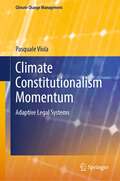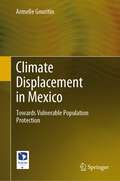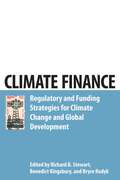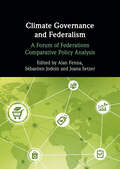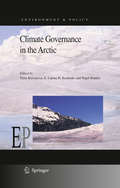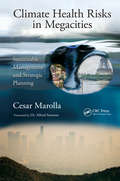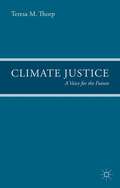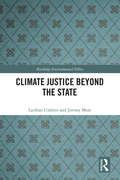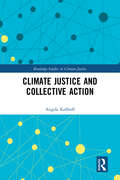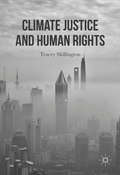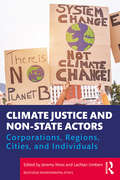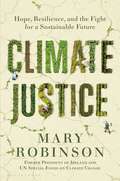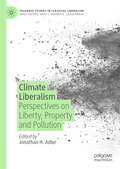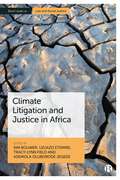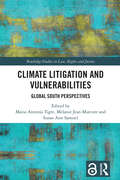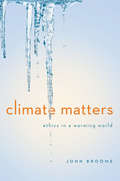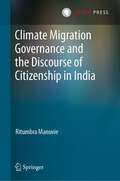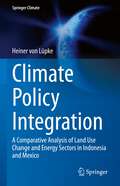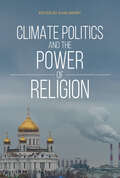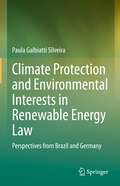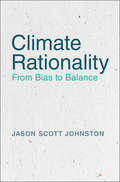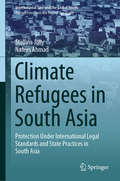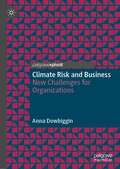- Table View
- List View
Climate Constitutionalism Momentum: Adaptive Legal Systems (Climate Change Management)
by Pasquale ViolaWhile civil society and social movements claim for more effective measures to cope with anthropogenic climate change, legal scholars are witnessing the “aurora” of climate change law. What is quite relevant in this double-process of recognition/establishment is the interdisciplinary nature of such a field of studies, which goes beyond formalistic legal aspects.Based on the need to rethink legal paradigms, “Climate Constitutionalism Momentum: Adaptive Legal Systems” deals with three major means to combat anthropogenic climate change—namely science, politics and law—further addressing the thesis regarding a supposed adaptiveness of legal systems and proposing new pathways for further inquiries on the current climate constitutionalism momentum. The book introduces the international efforts in acknowledging the need for concrete measures to achieve ambitious results, addressing the comparative public law debate, merging theoretical appraisals and quantitative insights under a top-down approach and a civil-law methodology. Furthermore, the book combines theoretical and empirical viewpoints in reference to climate justice and litigation. The last part of the argumentative pattern merges the aforementioned key elements and grounds of investigation, providing an overall account of the current climate constitutionalism momentum.Academic researchers are the book’s primary audience, but it is also targeted for undergraduate and postgraduate students of specific courses. For the numerous insights and the contemporary relevance of the topic, the book is also addressed to political stakeholders and legal practitioners. Given the transnational development of this area of law, the expected audience of the book is global.
Climate Displacement in Mexico: Towards Vulnerable Population Protection
by Armelle GouritinThis book presents the updated results of an investigation carried out in 2019. The National Autonomous University of Mexico’s (UNAM) Climate Change Research Program (PINCC), funded the research coordinated by Armelle Gouritin. The research aims to answer the following questions: Does the Mexican legal framework and public policies address forced internal climate mobility? If not, what could be the elements of a legal framework and public policies to address the phenomenon? As the phenomenon was approached it was clear that it was extremely complex and consisted of numerous tensions that would lead to other questions throughout the research process.Climate forced internal displacement is projected as a huge-scale phenomenon in Mexico. Against this background, the book provides the first critical diagnosis of the current politico-legal Mexican framework and finds it to be lagging behind in terms of prevention and attention. The book analyses the three-level Mexican governance (federal, state and local levels), and identifies serious loopholes according to a rights-based approach that particularly focuses on women, indigenous peoples, and persons and communities with scarce economic resources. The results provide information on up-coming legislative and political processes and provide benchmarks that can be applied in other case-studies, including other national frameworks’ critical analysis.
Climate Finance: Regulatory and Funding Strategies for Climate Change and Global Development
by Richard B. Stewart Benedict Kingsbury Bryce RudykPreventing risks of severe damage from climate change not only requires deep cuts in developed country greenhouse gas emissions, but enormous amounts of public and private investment to limit emissions while promoting green growth in developing countries. While attention has focused on emissions limitations commitments and architectures, the crucial issue of what must be done to mobilize and govern the necessary financial resources has received too little consideration. In Climate Finance, a leading group of policy experts and scholars shows how effective mitigation of climate change will depend on a complex mix of public funds, private investment through carbon markets, and structured incentives that leave room for developing country innovations. This requires sophisticated national and global regulation of cap-and-trade and offset markets, forest and energy policy, international development funding, international trade law, and coordinated tax policy.Thirty-six targeted policy essays present a succinct overview of the emerging field of climate finance, defining the issues, setting the stakes, and making new and comprehensive proposals for financial, regulatory, and governance mechanisms that will enrich political and policy debate for many years to come. The complex challenges of climate finance will continue to demand fresh insights and creative approaches. The ideas in this volume mark out starting points for essential institutional and policy innovations.
Climate Governance and Federalism: A Forum of Federations Comparative Policy Analysis
by Sébastien Jodoin Alan Fenna Joana SetzerThe majority of the world's largest carbon emitters are either federations or have adopted systems of decentralised governance. The realisation of the world's climate mitigation objectives therefore depends in large part on whether and how governments within federal systems can cooperate to reduce carbon emissions and catalyse the emergence of low-carbon societies. This volume brings together leading experts to explore whether federal or decentralised systems help or hinder efforts to mitigate and adapt to climate change. It reviews the opportunities and challenges federalism offers for the development and implementation of climate mitigation and adaption policies and identifies the conditions that influence the outcomes of climate governance. Including in-depth case studies of 14 different jurisdictions, this is an essential resource for academics, policymakers and practitioners interested in climate governance, and the best practices for enhancing climate action. This title is also available as Open Access on Cambridge Core.
Climate Governance in the Arctic (Environment & Policy #50)
by E. Carina Keskitalo Nigel Bankes Timo KoivurovaClimate change is affecting the Arctic environment and ecosystems at an accelerating speed, twice the rate of the global average. This is opening the Arctic to transportation and resource development and creating serious challenges for local communities and indigenous peoples. Climate Governance in the Arctic considers two aspects of climate change from an institutional perspective. It focuses on how relevant regimes, institutions and governance systems support mitigation of climate change. It also examines the extent to which the varying governance arrangements in the Arctic support adaptation and the development of adaptation processes for the region. The book's focus on Arctic governance offers unique insights within climate change mitigation and adaptation research.
Climate Health Risks in Megacities: Sustainable Management and Strategic Planning
by Cesar MarollaClimate Health Risks in Megacities: Sustainable Management and Strategic Planning courageously confronts the immense challenges of alleviating climate change and takes the initiative to layout an agenda that calls for action in the rapidly changing landscape of our global climate. This guide provides a constructive methodology for developing and implementing risk management and operational continuity management systems to climate change effects on urban populations. It addresses key issues such as physical location, proper sanitation, food security and vector-borne diseases against the backdrop of climate change, and then model its effect on the urban dwellers. The author also reveals the benefits of implementing a unique risk management approach to combat global threats and focuses on building urban resilience in the face of disasters. Prepared with a comprehensive and forward-thinking style, this book draws on indispensable case studies in key megacities like New York, Los Angeles, Beijing, Rio de Janeiro, London, Mumbai, and Lagos, and links researchers, scientists, city’s mayors, environmentalists, policy-makers and world leaders from central areas to review, reflect, and expound on future directions.
Climate Justice
by Teresa M. ThorpIn this ground-breaking work, Teresa Thorp tackles the causes and effects of climate injustice by methodically mapping out an approach by which to reach a negotiated consensus with legal force to protect present and future generations. Using the law and policy of climate change as a vehicle for illustrating how to shape our future, she comprehensively overturns the widely held contemporary view of climate justice as inconstant charitable acts, relative systemic notions and static concepts isolated from the common good and a congruent rule of law. Responding to the adverse impacts of climate change (heat waves, extended drought, severe flooding and desertification), which represent an urgent and potentially irreversible threat to human societies and the planet, requires a new and cohesive way of thinking about global policy and the law. The mission of guaranteeing and realising human dignity, human security and human rights is multi-fold. Looking through the lens of kaleidoscopic normativity, an extensible language anchored in common juridical elements should facilitate how norms enter the socio-legal frame and interact within it. Users need to be able to display and interpret the congruent legal norm in order to obey and apply it. Galvanising this process by constitutionalising first principles and consequential norms is vital for attaining fraternity between nations and among all people. Climate Justice - A Voice for the Future is an essential read for scholars, practitioners and all those genuinely interested in reaching consensus on a post-2015 global climate accord, a unified development agenda and a cohesive pact for disaster-risk reduction.
Climate Justice Beyond the State (Routledge Environmental Ethics)
by Jeremy Moss Lachlan UmbersVirtually every figure in the climate justice literature agrees that states are presently failing to discharge their duties to take action on climate change. Few, however, have attempted to think through what follows from that fact from a moral point of view. In Climate Justice Beyond the State, Lachlan Umbers and Jeremy Moss argue that states’ failures to take action on climate change have important implications for the duties of the most important actors states contain within them – sub-national political communities, corporations, and individuals – actors that have been largely neglected in the climate justice literature, to date. Sub-national political communities and corporations, they argue, have duties to immediately, aggressively, and unilaterally reduce their emissions. Individuals, on the other hand, have duties to help promote collective action on climate change. Along the way, they contribute to a range of important contemporary debates, including those over the nature of collective duties, what agents are required to do under conditions of partial compliance, and the requirements of fairness. Targeted at academic philosophers working on climate justice, this book will also be of great interest to students and scholars of global justice, applied ethics, political philosophy, and environmental humanities.
Climate Justice and Collective Action (Routledge Studies in Climate Justice)
by Angela KallhoffThis book develops a theory of climate cooperation designed for concerted action, which emphasises the role and function of collectives in achieving shared climate goals. In debates on climate change action, research focuses on three major goals: on mitigation, on adaptation and on transformation. Even though these goals are accepted, concerted action is still difficult to realize. Climate Justice and Collective Action provides an analysis of why this is the case and develops a theory of climate cooperation designed to overcome the existing roadblocks. Angela Kallhoff starts with a thorough analysis of failures of collective action in the context of climate change action. Taking inspiration from theories of water cooperation, she then establishes a theory of joint action that reframes climate goals as shared goals and highlights the importance of adhering to principles of fairness. This also includes an exploration of the normative claims working in the background of climate cooperation. Finally, Kallhoff puts forward proposals for a fair allocation of duties to cooperate with respect to climate goals. This book will be of great interest to students and scholars of climate action, climate justice, environmental sociology and environmental philosophy and ethics more broadly.
Climate Justice and Disaster Law
by Rosemary LysterClimate disasters demand an integration of multilateral negotiations on climate change, disaster risk reduction, sustainable development, human rights and human security. Via detailed examination of recent law and policy initiatives from around the world, and making use of a capability approach, Rosemary Lyster develops a unique approach to human and non-human climate justice and its application to all stages of a disaster: prevention; response, recovery and rebuilding; and compensation and risk transfer. She comprehensively analyses the complexities of climate science and their interfaces with the law- and policy-making processes, and also provides an in-depth analysis of multilateral climate change negotiations under the 1992 United Nations Framework Convention on Climate Change.
Climate Justice and Historical Emissions
by Meyer Lukas H. Pranay SanklechaThis volume investigates who can be considered responsible for historical emissions and their consequences, and how and why this should matter for the design of a just global climate policy. The authors discuss the underlying philosophical issues of responsibility for historical emissions, the unjust enrichment of the earlier developed nations, as well as questions of transitional justice. By bringing together a plurality of perspectives, both in terms of the theoretical understanding of the issues and the political perspectives on the problem, the book also presents the remaining disagreements and controversies in the debate. Providing a systematic introduction to the debate on historical emissions and climate change, this book provides an unbiased and authoritative guide for advanced students, researchers and policymakers in climate change justice and governance, and more widely, for anyone interested in the broader issues of global justice.
Climate Justice and Human Rights
by Tracey SkillingtonThis book shows that escalating climate destruction today is not the product of public indifference, but of the blocked democratic freedoms of peoples across the world to resist unwanted degrees of capitalist interference with their ecological fate or capacity to change the course of ecological disaster. The author assesses how this state of affairs might be reversed and the societal relevance of universal human rights rejuvenated. It explores how freedom from want, war, persecution and fear of ecological catastrophe might be better secured in the future through a democratic reorganization of procedures of natural resource management and problem resolution amongst self-determining communities. It looks at how increasing human vulnerability to climate destruction forms the basis of a new peoples-powered demand for greater climate justice, as well as a global movement for preventative action and reflexive societal learning.
Climate Justice and Non-State Actors: Corporations, Regions, Cities, and Individuals (Routledge Environmental Ethics)
by Jeremy MossThis book investigates the relationship between non-state actors and climate justice from a philosophical perspective. The climate justice literature remains largely focused upon the rights and duties of states. Yet, for decades, states have failed to take adequate steps to address climate change. This has led some to suggest that, if severe climate change and its attendant harms are to be avoided, non-state actors are going to have to step into the breach. This collection represents the first attempt to systematically examine the climate duties of the most significant non-state actors – corporations, sub-national political communities, and individuals. Targeted at academic philosophers working on climate justice, this collection will also be of great interest to students and scholars of global justice, applied ethics, political philosophy and environmental humanities.
Climate Justice: Hope, Resilience, and the Fight for a Sustainable Future
by Mary RobinsonHolding her first grandchild in her arms in 2003, the author was struck by the uncertainty of the world he had been born into. Before his fiftieth birthday, he would share the planet with more than nine billion people-people battling for food, water, and shelter in an increasingly volatile climate. The faceless, shadowy menace of climate change had become, in an instant, deeply personal. This book is a stirring manifesto on one of the most pressing humanitarian issues of our time, affirmative, and well-argued case for hope.
Climate Liberalism: Perspectives on Liberty, Property and Pollution (Palgrave Studies in Classical Liberalism)
by Jonathan H. AdlerClimate Liberalism examines the potential and limitations of classical-liberal approaches to pollution control and climate change. Some successful environmental strategies, such as the use of catch-shares for fisheries, instream water rights, and tradable emission permits, draw heavily upon the classical liberal intellectual tradition and its emphasis on property rights and competitive markets. This intellectual tradition has been less helpful, to date, in the development or design of climate change policies. Climate Liberalism aims to help fill the gap in the academic literature examining the extent to which classical-liberal principles, including an emphasis on property rights, decentralized authority and dynamic markets, can inform the debate over climate-change policies. The contributors in this book approach the topic from a range of perspectives and represent multiple academic disciplines. Chapters consider the role of property rights and common-law legal systems in controlling pollution, the extent to which competitive markets backed by legal rules encourage risk minimization and adaptation, and how to identify the sorts of policy interventions that may help address climate change in ways that are consistent with liberal values.
Climate Litigation and Justice in Africa
by Kim Bouwer, Uzuazo Etemire, Tracy-Lynn Field and Ademola Oluborode JegedeEPDF and EPUB available Open Access under CC-BY-NC-ND licence. In recent years, climate litigation has become an important subject of global scholarly and policy interest. However, developments within the Global South, particularly in Africa, have been largely neglected. This volume brings together an international team of contributors to provide a much-needed examination of climate litigation in Africa. The book outlines how climate litigation in Africa is distinct as well as pinpointing where it connects with the global conversation. Chapters engage with crucial themes such as human rights approaches to climate governance, corporate liability and the role of gender in climate litigation. Spanning a range of approaches and jurisdictions, the book challenges universal concepts around climate and the role of activism (including litigation) in seeking to advance climate governance.
Climate Litigation and Vulnerabilities: Global South Perspectives (Routledge Studies in Law, Rights and Justice)
by Maria Antonia Tigre Melanie Jean Murcott Susan Ann SamuelThis volume explores climate litigation as a means to tackle the rights and socio-ecological, intergenerational, gender, racial, and other justice implications of the ever-growing vulnerability to climate change, whilst critically engaging with the notions of vulnerability and intersectional climate justice.With insightful analysis, thought-provoking case studies, and a global perspective, the collection illustrates the opportunities and pitfalls of litigation pursued by people from the Global South who face intersecting forms of oppression and marginalisation amidst the climate crisis. Contributors discuss litigation strategy, novel legal arguments, institutional barriers, and unique socio-ecological and political challenges in the Global South. Divided into two parts, the book recognises that climate change is an existential threat to humanity more frequently being tackled in courts worldwide. The first part exposes the limits of litigation as a mechanism for intersectional climate justice for vulnerable people in the Global South. The second part highlights innovations in climate litigation in pursuit of intersectional climate justice.The book will be of interest to academics, researchers, and policymakers in the areas of human rights law, environmental law, climate law, Latin American studies, South Asian studies, and African studies.
Climate Matters: Ethics in a Warming World (Norton Global Ethics Series)
by John BroomeA vital new moral perspective on the climate change debate. Esteemed philosopher John Broome avoids the familiar ideological stances on climate change policy and examines the issue through an invigorating new lens. As he considers the moral dimensions of climate change, he reasons clearly through what universal standards of goodness and justice require of us, both as citizens and as governments. His conclusions--some as demanding as they are logical--will challenge and enlighten. Eco-conscious readers may be surprised to hear they have a duty to offset all their carbon emissions, while policy makers will grapple with Broome's analysis of what if anything is owed to future generations. From the science of greenhouse gases to the intricate logic of cap and trade, Broome reveals how the principles that underlie everyday decision making also provide simple and effective ideas for confronting climate change. Climate Matters is an essential contribution to one of the paramount issues of our time.
Climate Migration Governance and the Discourse of Citizenship in India
by Ritumbra ManuvieThis book offers an in-depth analysis of how governments in vulnerable regions respond to climate migrations. The author argues that, despite the newness of the discipline, responding to hydro-meteorological disasters at the sub-state level is fairly old and institutionalised. Using the example of India, and the State of Assam, the author demonstrates how existing rights-based frameworks are used as norms for governing climate migrations. However, these normative frameworks become futile when the sub-state simultaneously contests the status of climate migrants as legitimate citizens. Instead, the responsibility is replaced with pity-making and the state becomes an empathetic spectator - who understands the misfortune but refuses to be held accountable for either the development or protection of those worst affected by climate change. Those who migrate due to climate change often find themselves stripped of their lands (because of erosion) and their political belonging to the society. The volume will be useful for those studying climate migrations and disaster responses to better understand how communities which are most affected by climatic disasters may not even have a right to have rights against the State they found themselves in. Ritumbra Manuvie is a Senior Researcher and Lecturer of Law at the University of Groningen, The Netherlands. The author studied migration, citizenship, and belonging in Assam during her doctoral work at the University of Edinburgh. She is currently part of the ELSA - North Netherlands lab which aims to study Ethical, Legal, and Socio-political factors that influence the usage of AI in the health sector.
Climate Policy Integration: A Comparative Analysis of Land Use Change and Energy Sectors in Indonesia and Mexico (Springer Climate)
by Heiner von LüpkeThis book analyzes climate policy integration processes by investigating cause-effect relations in cases of integrating climate policy in energy and land-use sectors of Indonesia and Mexico, taking a novel comparative case study approach. The book identifies root causes for integration outside of the public administration, discussing decisive factors in the political economy of the energy and land-use sectors. Showing how policy windows may open for the successful integration of climate policies nevertheless, the book addresses the need to identify and properly use these windows to establish the administrative and institutional arrangements for effective climate policy implementation. This book offers two-fold insights for overcoming the challenges posed by climate policy integration: Firstly, it contributes to theory-building by amending theories of the policy process and by taking a wider perspective on the role of integration in the context of transformational change processes in emerging economies. Secondly, it sets forth a set of research-based practical policy recommendations on how to foster climate policy integration in the political decision-making processes as well as the public administration structures. Therefore, this book will appeal to scholars and researchers of public policy, public administration, political science, and environmental sciences, as well as policy-makers and practitioners interested in a better understanding of climate policy integration in energy and land-use sectors.
Climate Politics and the Power of Religion
by Ken Conca Andrew Thompson Ana Mariella Bacigalupo Kelly D. Alley J. Brent Crosson David T. Buckley Roger-Mark De Souza Neeraj VedwanHow does our faith affect how we think about and respond to climate change?Climate Politics and the Power of Religion is an edited collection that explores the diverse ways that religion shapes climate politics at the local, national, and international levels. Drawing on case studies from across the globe, it stands at the intersection of religious studies, environment policy, and global politics.From small island nations confronting sea-level rise and intensifying tropical storms to high-elevation communities in the Andes and Himalayas wrestling with accelerating glacial melt, there is tremendous variation in the ways that societies draw on religion to understand and contend with climate change. Climate Politics and the Power of Religion offers 10 timely case studies that demonstrate how different communities render climate change within their own moral vocabularies and how such moral claims find purchase in activism and public debates about climate policy. Whether it be Hindutva policymakers in India, curanderos in Peru, or working-class people's concerns about the transgressions of petroleum extraction in Trinidad—religion affects how they all are making sense of and responding to this escalating global catastrophe.
Climate Protection and Environmental Interests in Renewable Energy Law: Perspectives from Brazil and Germany
by Paula Galbiatti SilveiraThis book is about environmental and climate legal protection in the energy transition. The Paris Agreement has a binding commitment of holding the global temperature increase to 2°C while pursuing efforts to limit it to 1.5°C. To cope with the negative effects of climate changes and mitigate greenhouse gas emissions, one of the primary responses has been the deployment of renewable energy sources, transiting from fossil fuels to sustainable electricity production. However, renewable energy sources can also cause significant environmental impacts. Wind energy, for instance, can impact biodiversity, such as birds and bats, killing them when colliding with turbines and affecting their migration and nesting.This results in conflicts in environmental law. This book questions whether, in the energy transition, the generation of electricity from renewable sources to protect the climate is compatible with the protection of the environment, both interests in environmental law.To address this question, this book follows a legal-environmental perspective and assesses the common problem of solving those internal environmental conflicts in Brazilian and German law to understand and compare whether and how both legal systems solve the conflicts by compatibilizing the protection of the climate with other environmental interests. The legal analysis focuses on land-use planning and environmental licensing, assessing similarities and differences, and evaluating the results, identifying what one country can learn from the other.
Climate Rationality: From Bias to Balance
by Jason S. JohnstonMost environmental statutes passed since 1970 have endorsed a pragmatic or 'precautionary' principle under which the existence of a significant risk is enough to trigger regulation. At the same time, targets of such regulation have often argued on grounds of inefficiency that the associated costs outweigh any potential benefits. In this work, Jason Johnston unpacks and critiques the legal, economic, and scientific basis for precautionary climate policies pursued in the United States and in doing so sheds light on why the global warming policy debate has become increasingly bitter and disconnected from both climate science and economics. Johnston analyzes the most influential international climate science assessment organizations, the US electric power industry, and land management and renewable energy policies. Bridging sound economics and climate science, this pathbreaking book shows how the United States can efficiently adapt to a changing climate while radically reducing greenhouse gas emissions.
Climate Refugees in South Asia: Protection Under International Legal Standards and State Practices in South Asia (International Law and the Global South)
by Stellina Jolly Nafees AhmadThis book addresses the forms of legal protection extended to people displaced due to the consequences of climate change, and who have either become refugees by crossing international borders or are climatically displaced persons (CDPs) in their own homelands. It explores the legal response of the South Asian Jurisdictions to these refugee-like situations, and also to what extent these people are protected under current international law. The book critically examines and assesses whether States have obligations to protect people displaced by climate change under international refugee law (IRL) and international climate change law (ICCL). It discusses the issue of climate migration in South Asia, analyzes the legal and judicial response initiated by South Asian nations, and also investigates the role of SAARC in relation to climate change and climate refugees. Drawing on the International Legal Standards and States’ Practices in South Asia regarding climate refugees, the book shows how IRL, ICCL, and IHRL (international human rights law) have been used to address and identify the gaps in the global legal protection framework concerning the contours of the normative debate on climate refugees, climate change displacement, migration, forced migration, susceptibility to climate change, typology of climate change-induced displacement, role of the SAARC and its municipal legal systems, approaches to climate change, human mobility and developing a hybrid regional law, or advocating a legal alternative of equal measure in a region characterized by diversity and multiculturalism. The book offers valuable takeaways for students, researchers, consultants, practitioners and policymakers alike.
Climate Risk and Business: New Challenges for Organizations
by Anna DowbigginAddressing the urgency of radical decarbonization as a mitigative response to climate risk, this book explores how business can respond to the challenges of climate risk, through various transformational processes. Those processes involve cognitive transformations, organizational changes, climate risk integration into risk management practices, shifts in corporate reporting and disclosure as well as futuristic scenario-based planning beyond normal business planning cycles. Though much has already been written on corporate sustainability efforts, there is a greater need now for building mitigative capacity at the firm level, in alignment with shifting policy and regulatory regimes. Theoretical and empirical work on these areas is addressed in the novel thought experiment approach of this book. A research agenda for future work is provided.
